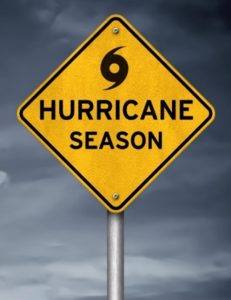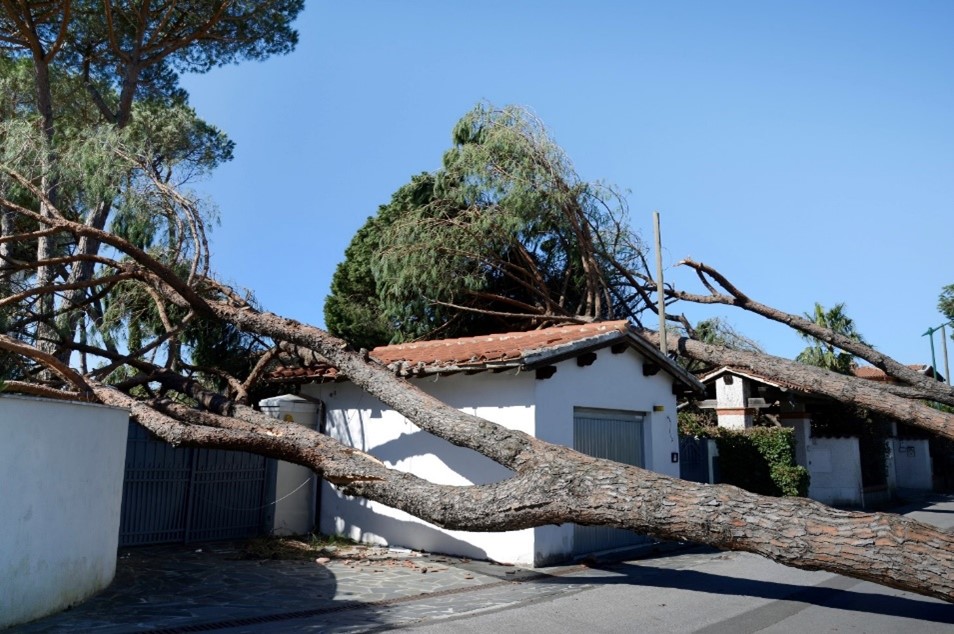In the month of October, we are more than halfway through the Atlantic Hurricane season, which ends on November 30th. Nonetheless, it is important to stay prepared and be ready for the unexpected.
October has historically proven to be an active month in the hurricane season with the peak running through mid-August to late October. The state of Florida has had 11 major hurricanes category 3 or higher hit in October, recently, the worst ones being Hurricane Michael in 2018, Hurricane Matthew in 2016, and Hurricane Wilma in 2005.
We can never know what the aftermath of a hurricane will bring, but we do know how critical it is to prepare for the worst-case scenario with plenty of time before disaster strikes.
Protect Your Family
Before the threat of a hurricane is imminent, it is important to have a plan to keep your family and pets out of harm’s way.

- Know your evacuation plan
Find out if your home is in a designated evacuation zone. If it is, plan an evacuation route and destination to take your family. You can stay with family or friends who live in a non-evacuation zone, or at an official shelter (keep in mind, most shelters don’t allow pets). If an evacuation order is issued by officials, plan on traffic congestion resulting in longer travel times. Your family, including children, should know the evacuation plan and be ready to go at a moment’s notice.
- Prepare an emergency kit
Natural disasters can lead to power outages so it is important to test your generators, have cell phones charged, and keep emergency supplies on hand. Prepare your emergency kit ahead of time to avoid a shortage of supplies.
Your emergency kit should include:
- Three-day water supply
- Canned or dried foods
- Medications
- NOAA weather radio
- Flashlight/ candles
- Waterproof matches/ lighters
- Can opener
- First-aid kit
- Tool kit
- Personal hygiene items
- Whistle
- Sanitation supplies
- Masks
- Propane gas
- Extra batteries
- Backup charging device
- Designate a shelter room
If your home is in a non-evacuation zone, you can plan on staying there in the event of a hurricane. Designate a room that does not have windows and is centrally located on the first floor as the shelter room for the household. Keep blankets and sleeping bags in the room.
- Fill your bathtub with water
If you plan on waiting the storm out in your home, it is a good idea to fill your bathtub with water in case of an outage. This water can be used to clean up, flush the toilet, or purified to drink if necessary.
- Review important documents
Make sure your personal documents such as IDs are up to date. Keep laminated copies or store them in a digital cloud.
Protect Your Home
Hurricanes bring on serious weather conditions such as heavy rainfall, floods, storm surge, powerful winds, flying debris, and more. Take the steps this hurricane season to protect your home from extreme weather conditions that can quite literally, blow the roof off your house.

1. Review your insurance coverage
Most insurance policies provide coverage for temporary repairs from natural disasters, including additional living expenses if you have to evacuate. Make sure your home insurance policy is up to date and determine if you need to purchase additional coverage for flooding or windstorm damage.
2. Take photos of your home
Greenberg Ramón-Alonso & Urbano recommends you take photos of your home before a natural disaster. From experience, we know that having photos of the property prior to any damages aids in the insurance claim being resolved more smoothly for the homeowner. Take photos of every part of your home, zoomed out to get the entire home or bedroom in the photo, and up close to get more detail.
3. Protect the exterior
Keep trees and shrubs trimmed to minimize flying debris. Bring loose, outdoor items inside your home such as patio furniture, bicycles, and potted plants.
4. Secure windows
 Protect windows and doors by investing in impact-resistant glass, storm shutters, or plywood.
Protect windows and doors by investing in impact-resistant glass, storm shutters, or plywood.
5. Move your car
Park cars inside your garage against the garage doors or on higher ground to prevent damage. Be sure to fill up your fuel tanks.
6. Unplug electronics
Unplug electronics and move them away from windows.
What To Do After a Hurricane
The measures taken to protect your home may not be enough to keep it from being damaged by a hurricane. If your home has been damaged, take the following steps to get your insurance claim taken care of.

1. Take photos of your home
Greenberg Ramón-Alonso & Urbano recommends you take photos/ videos of all damages. Documenting all damages with a complete photographic record will show proof when filing your insurance claim. When you take photos of your home, make sure you get all sides of the house and as much of the roof as possible. Photograph the entire yard as well. Take photos of entire rooms and of individual items. Create a written inventory of all damages.
2. Keep a record of expenses
Keep a detailed record of all expenses you incur related to the disaster for potential reimbursement.
3. Cover the property
The insurance company may deny your claim if they believe damages occurred after a hurricane. Use tarps to protect your property from additional damage and remove anything that can damage your home further. Install a fence or barrier to keep your belongings safe.
4. Do not sign for non-emergency repairs
Do not sign a contract for any non-emergency repairs. Your insurance company will likely need to be consulted on pricing before any repairs are made.
5. File your claim as soon as possible
It is in your best interest to promptly file your insurance claim so the claim process can get resolved as quickly as possible.
Call Greenberg Ramón-Alonso & Urbano
Too often, insurance companies deny or attempt to minimize the value of a homeowner’s claim when the conditions are perfectly valid and should be covered. Our extensive experience has taught us how to fight insurance companies and win. We can build the case you need to clearly show how the insurance company is violating the terms of your policy so that we can secure the full compensation you are entitled to. For a free consultation, call (305) 595-2400.
Sources:
- https://www.ready.gov/hurricanes
- https://www.fema.gov/blog/how-prepare-hurricane-season
- https://www.wtsp.com/article/weather/tropics/peak-hurricane-season-begins-in-mid-august/67-fdb3166b-7f6e-4886-a8b0-64eb0a9fc7c4
- https://www.chubb.com/us-en/individuals-families/resources/10-steps-to-prepare-for-a-hurricane.html
- https://rainbowintl.com/blog/storm-series-how-to-prepare-your-home-for-hurricane-season


